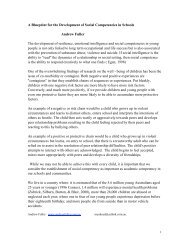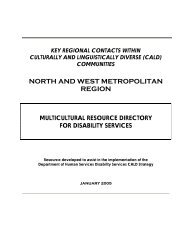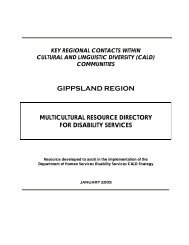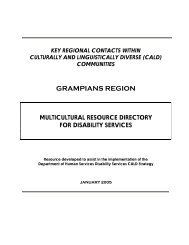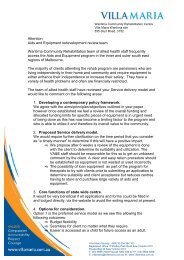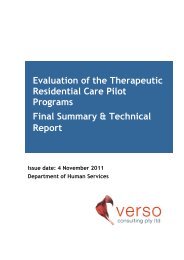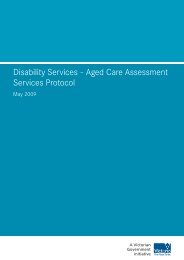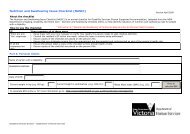Positive Behaviour Support - Department of Human Services - Vic ...
Positive Behaviour Support - Department of Human Services - Vic ...
Positive Behaviour Support - Department of Human Services - Vic ...
You also want an ePaper? Increase the reach of your titles
YUMPU automatically turns print PDFs into web optimized ePapers that Google loves.
<strong>Positive</strong> behaviour support: Getting it right from the start - Facilitators reference manual 67<br />
1. Changes to the environment<br />
This involves an understanding <strong>of</strong> relevant environmental factors that may be contributing to<br />
the behaviour <strong>of</strong> concern. An analysis <strong>of</strong> the STAR charts will have identified possible factors<br />
which may include undiagnosed medical conditions or possible side effects to medication. In<br />
addition we need to plan how we will change the environment to ensure a ‘smooth’ fit between<br />
the individual and where they live and work.<br />
2. Teaching skills<br />
This involves selecting and implementing skill development strategies, that is, skills the<br />
person can be supported to learn, instead <strong>of</strong> using the behaviour <strong>of</strong> concern. Skill development<br />
strategies need to be linked to the reason why the person is showing the behaviour <strong>of</strong> concern<br />
and the skills taught need to be as effective as if the person was using the behaviour <strong>of</strong> concern.<br />
3. Short-term change strategies<br />
These may be required for a short period <strong>of</strong> time to produce a rapid change in behaviour. These<br />
strategies are used to facilitate a more immediate change to the behaviour<br />
4. Immediate response strategies<br />
These strategies are used to minimise risk to the person and others by planning responses<br />
aimed at de-escalating or managing a serious episode <strong>of</strong> the behaviour. These strategies provide<br />
all involved with a plan for immediately responding to the behaviour as it occurs. These strategies<br />
do not promote long-term behaviour change; they are only intended to manage a serious episode<br />
<strong>of</strong> the behaviour.<br />
Putting what you have learnt into practice<br />
Over the past two days you have covered topics including<br />
• human rights<br />
• the importance <strong>of</strong> background factors and their potential impact on the people<br />
you support<br />
• the importance <strong>of</strong> getting to know the people you support well and how this may<br />
affect they way they interact or behave on a daily basis<br />
• stages <strong>of</strong> communication development<br />
• definitions <strong>of</strong> behaviours <strong>of</strong> concern<br />
• functional behavioural assessment<br />
• the recording <strong>of</strong> STAR charts<br />
• Motivation Assessment Scale<br />
As a team you have focussed on one person you all support and identified at least three<br />
behaviours <strong>of</strong> concern in relation to that person.<br />
On your return to your work it is important to practice what has been covered.<br />
It is expected that by the beginning <strong>of</strong> day 3 <strong>of</strong> this program you will have completed<br />
as a staff team step 1 to 4 <strong>of</strong> a functional behaviour assessment.<br />
Refer to Appendix 2 for details



